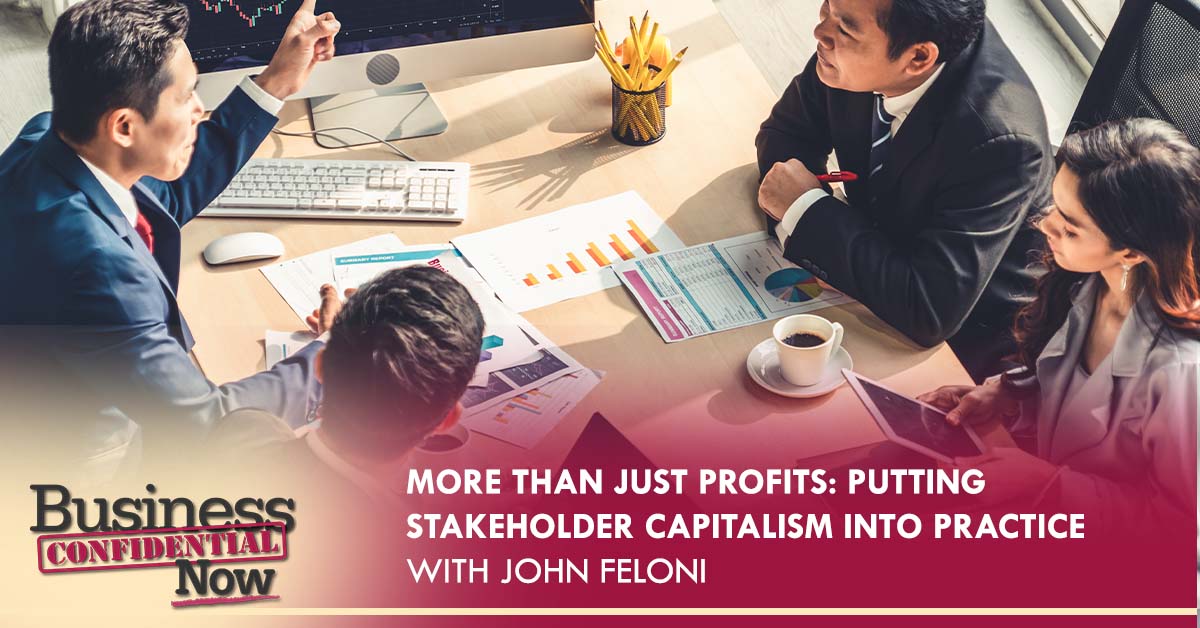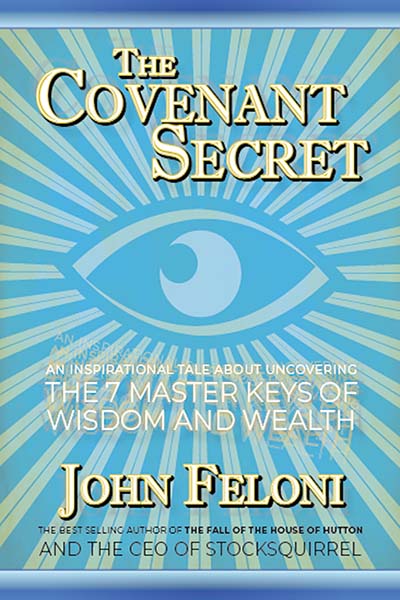
Photo Credit: © iStock Credit: August Karlsson
What is a business all about? Is it just for profits? Listen to your host Hanna Hasl-Kelchner as she sits down for a conversation with John Feloni about how stakeholder capitalism can create long-term value by considering every stakeholder’s needs. John uncovers the seven master keys of wisdom and wealth that could help you create success in today’s complicated world. He dives into effective leadership and management through building excellent relationships with everyone in your business. Generating revenue and profit is essential, but you can’t do that without your people. Tune in to learn how to stay focused on the things that matter and incorporate stakeholder capitalism in your organization.
—
What You’ll Discover About Stakeholder Capitalism
- What’s important in any business venture
- The seven principles of wisdom and wealth
- Definition of stakeholder capitalism
- Showing gratitude and serving people through stakeholder capitalism
- What’s holding people back from paying attention on what’s happening on the field
- Good ways to connect with stakeholders
- Creating success today through stakeholder capitalism
- What business leaders need to know about stakeholder capitalism
GUEST
 John Feloni is an author, entrepreneur, speaker, investment expert, and the founder and CEO of Stock Squirrel, Inc., a new FinTech that democratizes stock ownership. He’s the coauthor of the bestseller, The Fall of the House of Hutton, the story of the fall of the Wall Street powerhouse, EF Hutton. His new book is The Covenant Secret: An Inspirational Tale About Uncovering the 7 Master Keys of Wisdom and Wealth.
John Feloni is an author, entrepreneur, speaker, investment expert, and the founder and CEO of Stock Squirrel, Inc., a new FinTech that democratizes stock ownership. He’s the coauthor of the bestseller, The Fall of the House of Hutton, the story of the fall of the Wall Street powerhouse, EF Hutton. His new book is The Covenant Secret: An Inspirational Tale About Uncovering the 7 Master Keys of Wisdom and Wealth.
—
More Than Just Profits: Putting Stakeholder Capitalism Into Practice With John Feloni
We have an interesting guest for you. He’s John Feloni. He is an author, entrepreneur, speaker, investment expert and the Founder and CEO of Stock Squirrel Inc., a new FinTech that democratizes stock ownership. With my reference to stakeholder capitalism and his background in Wall Street, you might be thinking he’s going to give us some hot stock tips.
He’s going to do so much more than that because he is the bestselling author who addresses the hubris of misguided leadership and explores inspired leadership. He’s got a new book out called The Covenant Secret: An Inspirational Tale About Uncovering The 7 Master Keys of Wisdom and Wealth. I can’t wait to get smart about this. I’m curious what these master keys are and their connection to business and stakeholder capitalism. Welcome to the show, John.
Thank you very much for having me, Hanna.
I understand that your new book, The Covenant Secret, is about a fresh out of school business school hotshot with a startup company that is intensely focused on money. Since this show is for smart entrepreneurs and I’m sure there are a lot of readers who can identify with this young man and because generating revenue and profit is pretty important to business, what are these seven master keys and how can they help my readers?
First of all, one of the things that led me to the book was the money versus people question, “What is the business about?” A lot of people will say, “Money.” The bottom line is that even to have access to money, it’s through people. People are always the answer. I found out that in my business experience, people are treated badly for a lot of reasons. The ultimate given is its business.
Even companies that say that their greatest asset is their people have policies in their company that designs for the lowest common denominator of human behavior rather than trust and respect. That’s why I pursued this book with the seven master keys. Those principles are universal principles in regard to people. The first one is for sustained relationship success. It’s always about the relationship with people. Even in stakeholders, whether it’s your shareholders, customers, employees, vendors, partners and the community where you do business, it always has to do with relationships.
The first principle is for sustained relationship success. Do and say to others what you would like have done or said to you and do not say or do to others what you do not like having done or said to you is the golden rule which works always. Number two, that for which you show gratitude increases. Meister Eckhart, the great mystic, said, “If the only prayer you ever say in your entire life is thank you, it will be enough.” Plato said, “A grateful mind is a great mind, which eventually attracts itself to great things.” A universal law is that which you pay attention to expands.
People are treated badly for a lot of reasons. They have policies in their company that are designed for the lowest common denominator of human behaviors. And the excuse is that it's business. Share on X
We got to take the good things that are going on. Show gratitude for them and expand them to serve people. The third principle is to serve people optimally and discover what they value. Every one of your constituencies is going to value different things in it. It behooves you to find out what those things are to serve those principles and needs.
The fourth one is honesty builds trust. Trustworthiness is the foundation of character. Character determines the fruit and pleasure of a relationship, which is common sense. Five, the ability to influence others is the most valuable relationship asset. Demonstrated integrity determines the extent to which such influence is granted. It makes sense. It’s a universal law.
Six is passion plus compassion moves mountains. It behooves us to find out what all of our constituencies are passionate about and to help them fulfill those passions, which will help us fulfill our own. The seventh one is what you believe determines what you think, how you decide, the actions you take and what you accomplish. It behooves us to take an inventory of the things that we believe in and see if they serve us in our goals and objectives in life. Those are the seven principles.

Stakeholder Capitalism: It’s always about the relationship with people, whether it’s your shareholders, customers, employees, vendors, partners, or communities.
I was looking for the perfect or the best relationship principle. I found that the best relationship, not only in business but in the professions, is the professional-client relationship. What I mean by that is that’s the covenant. We can go into a store and be served by a clerk but if you go into a lawyer’s office, a CPA or even an executive’s office, that professional-client relationship puts you and your needs ahead of mine in my own. Within that professional-client relationship is that covenant. If we can bring that covenant, that professional-client relationship of serving the needs of others to such a fiduciary responsibility, relationships with all stakeholders will be that much better.
I hear what you’re saying and I’m going to be a little contrary here, John. That sounds like a lot of work. Can a small business and a startup afford to do that?
Not only afford it but it should also be the most important thing you do. A business has to have customers. Within your constituencies of different customers, you’re going to find that they have different needs. If you are not going to take the time to build that relationship with your customer ands find out how you serve them best, it’s not going to work. It’s the same thing with your employees, investors, partners and vendors. That time and work are monumental to determine the success of your enterprise.
If the only prayer you need to say your entire life is thank you. It will be enough. A grateful mind is a great mind, which eventually attracts itself to great things. Share on X
It makes a lot of sense but the quotations that you had before when you were talking about the different principles, their genesis and origin wasn’t something that happened last week or last year. They’ve been around for a long time. Why does this need to be repackaged as stakeholder capitalism all of a sudden?
These are universal principles. These always exist and work. Interestingly enough, I wrote this book many years ago on treating all stakeholders with these principles. It used to be in our capitalism that the shareholder was paramount and everybody else was secondary. Here’s what I found that’s very interesting. The shareholder is still paramount in that. That’s the only one in a business that you have a fiduciary legal responsibility.
However, especially in this world where customers and employees are picking companies that have the same values as them, it’s important to find out what these things are to best serve. When you are serving the stakeholder and all these stakeholders in stakeholder capitalism, that’s the best way ultimately to serve your shareholder.

Stakeholder Capitalism: If you’re not going to take the time to build that relationship with your customer and find out how you serve them best, then it’s just not going to work.
Consider that the shareholder and the investment itself is a scoreboard. On the field playing the game, you can’t pay attention to the scoreboard. That doesn’t get you anywhere. What you have to pay attention to is your interactions with these other stakeholders. You get the best score on the scoreboard and best serve the shareholders.
It is a very unique packaging since we are paying attention in a significant way, especially with the Millennials and Gen Z coming up here that care about the companies where they are going to work or the companies whose products they’re going to buy about the values they share regarding the treatment of all of the people who are part of a company and the business they’re in.
I like that comparison to keeping your eye on the scoreboard. You’re going to get tackled. You got to watch what’s happening on the field. What’s been holding people back from paying more attention to what’s happening on the field instead of looking at the scoreboard? Every quarter rolls around. For a lot of businesses, they’re looking every week and every month. There is this tremendous numerical pressure. You understand coming from that financial world that it doesn’t go away. How do they shift things around?
A business has to have customers, and within your constituencies of different customers, you will find that they have different needs. Share on X
The market is shifting for them. If they don’t pay attention, their businesses are going to have problems. What I mean by that is the new generation of Millennials and Gen Z are coming up. They are paying close attention to the companies that they either work for or do business with. Why this is very important is who is determining this change from shareholder capitalism versus stakeholder capitalism.
Primarily, it’s coming from the customers and employees from the Millennial and Gen Z generation who are not going to buy products and are not going to work for a company that they don’t share values. The market in the world is changing the business world and defining what stakeholder capitalism is and what should be and should affect the decision-making for executives.
John, help me understand this. What’s a good way for an organization to share its common values? Don’t give me the mission statement thing. Too many companies create policies for the lowest common denominator, which isn’t that cool. How are they going to walk the talk?

Stakeholder Capitalism: When you’re serving the stakeholder and all the stakeholders in stakeholder capitalism, that’s the best way ultimately to serve your shareholder.
There has to be a congruence and authenticity to it. I’ll never forget years ago when Shaun White, the snowboard king, won his gold medals in the Olympics. It was in Fast Company Magazine. He was on the cover. The interview was about having won his gold medals. There were twenty-plus companies that had offered him endorsement deals. He only took 2 or 3 endorsement deals and they asked him why. He looked at them like they had two heads. His answer was, “It’s because I use their products.”
Years ago, you paid Michael Jordan $1 million to say this is the best coffee cup that exists. That would be enough but it’s authenticity. You can send out press releases. If you’re not walking the talk with your customers, your employees, the way you treat partners, vendors, shareholders, the community where you live and the planet on which you do business, those things have to be synchronistic with what you’re preaching. In this world where information is spread very quickly, you must be authentic or you will be found out.
There’s no faking it anymore.
You have to get better at ensuring that you package your stories and actions in a better way to make sure it gets to the audiences where it will resonate. Share on X
That’s the best way to put it. You can’t fake it. You got to learn better ways to do this. We did a search at stocks world of 200 companies where Millennials and Gen Z do most of their shopping and spending of their money. We looked in depth at their websites and what they’re doing in ESG, which has to do with global warming and how they treat their employees and customers.
For example, we found that a company, McDonald’s of all people, a huge company with tremendous resources, is doing so many things for the environment, employees and communities in which they serve but yet no one knows about it. There’s not only walking the talk but you’ve got to be better at making sure that you get that message out in a coherent way and where it will resonate with your future customers and employees.
Let’s talk about that a little bit. What’s a good way to get the message out to connect with those stakeholders?

Stakeholder Capitalism: Information is spread very quickly. Your relationships with stakeholders should be synchronistic with what you’re preaching.
It has to be throughout the company. The message will get out there by the way you’re treating your employees. That’s easy to find out. The way you’re treating your customers, the way your product makes a difference in the world, the sustainability policies that you have in your company to address global warming and all that. You’ve got social networking.
You’ve got many ways of communicating but it happens at the grassroots, in the street, with every employee and every customer because words spread quickly. It’s being congruent and authentic and the way you treat all these different kinds of people and these different constituencies and letting the world know that in the social networking world, whether it be on TikTok, Instagram or Facebook, in sharing the stories of your customers and employees.
A couple of years ago, there was a press release from Starbucks where they had spent $25 million in helping out 1 farmer or 2 in Brazil. It’s a coffee farm. It was a typical press release that was done in legal speak in a PR release that they did this. Wall Street does not care one iota where you spend $25 million. However, if they took that story and put it out to the Gen Z market and Millennial market, those customers and employees would care that you were diligent enough to help out some farmers in Brazil. You have to get better at making sure that you package your stories and actions in a better way to make sure it gets to the audiences where they will resonate.
If someone doesn't care, don't hire them. If you're finding out that someone on your team isn't a caring person and that they're going to harm your company and you, get rid of them. Share on X
Let’s take this down to some real grassroots level. Let’s talk about the main street and the bootstrap startup. What advice do you have for them to engage in stakeholder capitalism?
I go back to the seven principles Every one of those constituencies and stakeholders when you’re starting your company have investors, employees, products, customers, the communities where you’re doing business and the planet, which we all exist on. Make sure that within all of those constituencies, you’re applying the seven principles. Be authentic and not fake it but care in applying those principles across the board. It’s not about money. You’ve got to concentrate on the people aspect of this for every one of those stakeholders in your business.
We all experience it, whether we get on a phone trying to solve a problem with our cell phone or a product that we bought. We get thrown around on the phone to machines and all that stuff. That’s not treating people the way we would want to be treated. You’ve got to pay attention to each and every one of these principles and make sure you’re applying it across the board in an authentic way. It’s that word that pervades good relationships, whether we get that person on the phone to solve our problem or in a store, we come across that person behind the counter that helps us. That one word that we have to find to have the people that work for us is the word care.

Stakeholder Capitalism: Especially in today’s world, applying those seven principles to all of the stakeholders of a business in a startup is critical.
They should care about what they’re doing. If they solve problems, the better your company’s going to be because there are going to be problems. Care about how your customers feel and how your employees feel and pay attention to that. Especially in this world, applying those seven principles to all of the stakeholders of a business in a startup is critical.
The advantage that a startup or a small business has is that they have more of a clean slate to start with. They’re not dealing with a lot of legacy-type issues but I’m curious, John, in your experience, dealing with maybe mid and larger-size organizations, do you believe that all of the leaders have the wherewithal to genuinely care?
If they don’t care, don’t hire them. If you’re finding out that someone on your team isn’t a caring person, regard for all of the aspects of relationships, they’re going to harm your company and you have to get rid of them. People are going to have to either play the game with care or the market itself is going to blow you out. The generations that we have of the Millennials and Gen Z can smell that authenticity 1 mile away and it behooves the entrepreneur to make sure that they’re hiring people that do care and have the values that you and your company are trying to promote into the marketplace. It’s critical in this world.

Stakeholder Capitalism: It’s treating every individual in those constituencies with the seven principles. It’s finding out their needs. It’s sitting down and finding out the passions and being compassionate to them within each one of those stakeholders.
You’re right as far as the legacy and the treatment of people in this world too. I’ll give you an example. This came from a concept that came out of Silicon Valley, even when I became CEO of a technology company prior to starting my own. I want to promote authentically trusting my employees and respecting them as individuals and adults.
The first thing I did was I made unlimited paid vacation time and unlimited paid sick time as well. Isn’t it interesting when you treat people with that respect and trust, you have to force them to take a vacation? When you give them that fiduciary responsibility as an adult with trust and respect, they embrace it. The world has changed in that regard.
We typically have policies for the lowest common denominator and mistreat all of our good people in the expectation that they’re going to be behaving badly. You switch that around to say, “I’m going to trust and respect all of my people.” The policies are going to be for the anomaly of bad behavior. We’ll address that when it happens but otherwise, we are trusting and respecting our people. It’s amazing that when you do that with people, they return it.
Some people are still going to be reluctant to have unlimited whatever.
I agree but those are the companies that are going to shine, attract good people and attract a customer that has the same values and cares about those issues, which is happening more.
In the short time we have left, John, in your opinion, what is the single most important thing you want business owners and leaders to know about stakeholder capitalism?
It’s treating every individual in every one of those constituencies with the seven principles. It’s finding out their needs. It’s sitting down and finding out their passions and being compassionate to them within each one of those stakeholders. Whether they’re your investor, employee, customer, partner or vendor, every one of those constituencies cares about things that are different from the other constituency. It’s up to you to find out what that care and concern is. Serve it, facilitate it and make it work. The onus is on you to find that out. That’s what makes stakeholder capitalism better. It also, interestingly enough, does a better job for the shareholder ultimately in the end.
John, thank you so much. I appreciate your time and helping us learn more about stakeholder capitalism and why it’s smart practice to engage in. For everyone reading, please be sure to tell all your business friends about the show and leave a positive review. The more you dive into all of our past episodes and follow the show, the more you’ll be able to see the issues hiding in plain view that matter to your bottom line and be able to start using those tips and strategies to grow your business and be more successful. Thanks so much for reading. Have a great day and an even better tomorrow.
Important Links
- Stock Squirrel Inc.
- The Covenant Secret: An Inspirational Tale About Uncovering The 7 Master Keys of Wisdom and Wealth
- http://JohnFeloni.com/
- https://Facebook.com/JohnFeloni
- https://Twitter.com/JohnFeloni
- Executive Leadership And Building A Talent Centric Organization With Carol Schultz – previous episode
- If you liked this interview you might also like these Leadership and Management episodes
Join, Rate and Review:
Rating and reviewing the show helps us grow our audience and allows us to bring you more of the rich information you need to succeed from our high powered guests. Leave a review at Lovethepodcast.com/BusinessConfidential
Joining the Business Confidential Now family is easy and lets you have instant access to the latest tactics, strategies and tips to make your business more successful.
Follow on your favorite podcast app here as well as on Twitter, Facebook, YouTube, and LinkedIn.
Download ♥ Follow ♥ Listen ♥ Learn ♥ Share ♥ Review ♥ Comment ♥ Enjoy
Ask Questions or Recommend a Topic/ Guest:
- Use our convenient Get in Touch form
- OR e-mail feedback(at)BusinessConfidentialRadio.com
Disclosure:
This post may contain links to products to products on Amazon.com with which I have an affiliate relationship. I may receive commissions or bonuses from your actions on such links, AT NO ADDITIONAL COST TO YOU.

